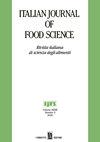Polygonatum polysaccharide attenuates inflammation through inhibiting NLRP3 inflammasome in diabetic cardiomyopathy rats
IF 3.3
4区 农林科学
Q2 FOOD SCIENCE & TECHNOLOGY
引用次数: 0
Abstract
Polygonatum polysaccharide (PP) has good myocardial protection. This study aims to find whether PP can relieve inflammation and play a protective role in diabetic cardiomyopathy (DCM). Intraperitoneal injection of streptozotocin was used to induce DCM in rats, which were then separated into four groups: model group, PP-200 group (200 mg/kg PP), PP-400 group (400 mg/kg PP), and Met group (120 mg/kg metformin). Both control (NC) and model groups of rats were administered normal saline. According to the kit instructions mentioned on the kit, the levels of blood glucose, glycosylated hemoglobin, insulin (INS), and myocardial enzymes (creatinine kinase, B-type natriuretic peptide, and cardiac troponin I) were measured after 8 weeks. Cardiac function was detected by echocardiography. Hematoxylin and eosin (HE) and Masson staining were used to observe pathological changes. Myocardial RNA and protein levels of NLR family pyrin domain containing 3 (NLRP3), caspase-1, and Gasdermin D (GSDMD) were quantified through reverse transcription-polymerase chain reaction and Western blotting analysis. The in vivo findings showed that PP could reduce blood glucose, glycosylated hemoglobin, and INS levels, enhance heart functioning, restore histological alterations and myocardial enzymes, and relieve myocardial fibrosis. Furthermore, PP suppressed the expressions of NLRP3, caspase-1, and GSDMD. PP could reduce inflammation in DCM rats by suppressing NLRP3 inflammasome.黄精多糖通过抑制糖尿病心肌病大鼠NLRP3炎症小体减轻炎症
黄精多糖(PP)具有良好的心肌保护作用。本研究旨在探讨PP在糖尿病性心肌病(DCM)中是否具有缓解炎症和保护作用。采用链脲佐菌素腹腔注射诱导大鼠DCM,将大鼠分为模型组、PP-200组(200 mg/kg PP)、PP-400组(400 mg/kg PP)和Met组(120 mg/kg二甲双胍)。对照组和模型组均给予生理盐水。根据试剂盒说明书,8周后测定血糖、糖化血红蛋白、胰岛素(INS)、心肌酶(肌酐激酶、b型利钠肽、心肌肌钙蛋白I)水平。超声心动图检测心功能。苏木精伊红(HE)染色及Masson染色观察病理变化。通过逆转录聚合酶链反应和Western blotting分析,定量NLR家族pyrin domain containing 3 (NLRP3)、caspase-1、Gasdermin D (GSDMD)心肌RNA和蛋白水平。体内实验结果显示,PP能降低血糖、糖化血红蛋白和INS水平,增强心脏功能,恢复心肌组织改变和心肌酶,减轻心肌纤维化。此外,PP抑制NLRP3、caspase-1和GSDMD的表达。PP可通过抑制NLRP3炎性体减轻DCM大鼠的炎症反应。
本文章由计算机程序翻译,如有差异,请以英文原文为准。
求助全文
约1分钟内获得全文
求助全文
来源期刊

Italian Journal of Food Science
工程技术-食品科技
CiteScore
4.20
自引率
0.00%
发文量
33
审稿时长
>36 weeks
期刊介绍:
"Italian Journal of Food Science" is an international journal publishing original, basic and applied papers, reviews, short communications, surveys and opinions on food science and technology with specific reference to the Mediterranean Region. Its expanded scope includes food production, food engineering, food management, food quality, shelf-life, consumer acceptance of foodstuffs, food safety and nutrition, energy and environmental aspects of food processing on the whole life cycle.
Reviews and surveys on specific topics relevant to the advance of the Mediterranean food industry are particularly welcome.
 求助内容:
求助内容: 应助结果提醒方式:
应助结果提醒方式:


